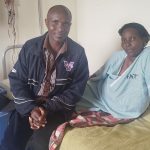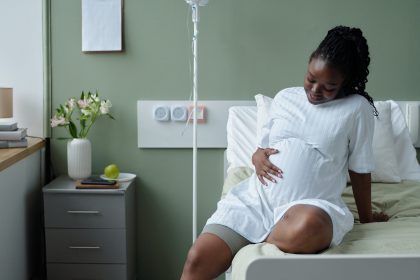When the bleeding stopped, Doreen thought it was over. She was wrong. She collapsed in her hostel room two weeks later: Her uterus severely infected, organs shutting down. The doctors tried everything. Sepsis took her life at 19- she knew nothing about post-abortion check-up…
Doreen was 19. A first-year university student in Meru County. And pregnant. She walked into a clinic, paid Ksh5,000 and was given a set of pills. The instructions were simple: swallow, wait for the bleeding to start, then move on with life. She did exactly just that.
For the first few days, everything seemed normal. Heavy bleeding, cramps. When the bleeding stopped, Doreen thought it was over.
She was wrong. She collapsed in her hostel room two weeks later. By the time she was brought to hospital, it was too late. Her uterus was severely infected, and her organs were shutting down. The doctors tried everything, but the infection had spread too far; sepsis took her life.
Doreen’s friends later admitted she had complained of excruciating pain, fever. She thought it was just part of the abortion process. No one told her she needed a post-abortion check-up, that “feeling fine” wasn’t enough.
Doreen’s story isn’t unique. In Kenya, abortion is a topic wrapped in controversy, but for many young women in universities and colleges, it’s a harsh reality they face in silence and a growing number are turning to backstreet abortion clinics or self-administering pills.
More than 75% of women with induced abortion experience sepsis, haemorrhage, shock, multiple organ failure
These pills, once tightly controlled, are now alarmingly easy to buy from regular chemists or a vendor on campus.
A 2023 policy brief by the African Population and Health Research Center (APHRC) showed that up to 14% of unintended pregnancies in Kenya end in abortion. More than 75% of women with induced abortion experience moderate to severe complications including sepsis, haemorrhage, shock, and multiple organ failure. Further, about 2,600 women and girls die annually from complications associated with unsafe abortion, that’s about seven women daily.
But here’s the real issue: while abortion pills are affordable and readily available, even to students, what happens after the abortion?
In most cases, once the bleeding stops or the foetus is expelled, these women simply move on, assuming everything is fine. Yet, without proper medical attention, complications like severe bleeding, infections, retained products of conception (RPOC) and long-term reproductive health issues crop up. And that’s not even touching on the emotional impact, with many struggling in silence with guilt, anxiety, or trauma.
Post-abortion care is a crucial part of reproductive health that could mean the difference between recovery and serious complications. So, why aren’t we talking about it?
In 2013, the Ministry of Health withdrew national guidelines on safe abortion, creating confusion
Unsafe abortions are a major public health concern, particularly among young women. Around 45% of post-abortion care patients are under the age of 19, highlighting the vulnerability of this age group.
The 2010 Kenya Constitution allows abortion in cases requiring emergency treatment or if, in the opinion of a trained health professional, the pregnancy endangers the life or health of the mother. But in 2013, the Ministry of Health withdrew the national guidelines on safe abortion, creating confusion among healthcare providers and limiting access.
Because of these legal grey areas, many women turn to clandestine abortion clinics or unregulated drug vendors. Beyond legal restrictions, societal stigma makes abortion an even more isolating experience. Many young women fear being judged, shamed or even disowned by their families if they procure an abortion, hence they often undergo the procedure in secret.
Even when complications arise, some hesitate to seek post-abortion care due to fear of being labelled. Healthcare providers, too, face challenges, as some refuse to provide abortion-related services due to personal or religious beliefs, while others fear legal repercussions.
Abortion pills are now easier to get than painkillers
This creates an environment where many women suffer in silence, unaware of the risk of untreated complications.
If there’s one thing my job has taught me, it’s that abortion doesn’t always end when the bleeding stops. Many young women walk into the ultrasound room thinking they’re fine, until the scan reveals remnants of the pregnancy in the uterus. And this is where things get serious.
Let’s talk about how we got here. Abortion pills are now easier to get than painkillers. I’ve spoken to students who bought them from their friends, neighbours, or online. The instructions? “Take this one first, then these after 24 hours, and you’ll be fine.” No one tells them what to do if the pills don’t work properly, nor do they check if they’re within the safe gestational period to take the pills.
And then there are the so-called abortion clinics, hidden behind pharmacy counters or backroom setups in private apartments. They promise “safe” procedures, but many of them don’t provide proper pre-abortion screening or post-abortion follow-up.
From what I’ve gathered during conversations with university students, the typical abortion begins with panic after discovering a missed period. The ensuing fear pushes one to find a solution either online, through friends, or in a chemist that “has someone”.
She takes the pills and if all goes well, moves on like nothing happened. If not, she will bleed too much and suffer excessive pain. Only when things become unbearable will she visit a hospital or get a scan, but by then, it’s too late.
Post-abortion care is the most critical phase and unfortunately, the most ignored
If there’s anything I wish young women knew, is that abortion isn’t just about “getting rid of the pregnancy.” Post-abortion care is just as important as the procedure itself, and the body needs monitoring afterwards.
The reality is that abortion, safe or unsafe, is happening. But what we can change is how it’s handled. Women need to be educated about proper post-abortion care, like when to seek medical help, why ultrasound scans matter, the risks of infections and long-term damage if aftercare is ignored.
While abortion remains a sensitive and legally restricted issue in Kenya, medical ethics demand that any woman who undergoes an abortion, whether planned, spontaneous, or incomplete, receive proper medical care. If an abortion is carried out within legal and medical guidelines, it should be done in a controlled environment by a trained healthcare professional.
First, a proper medical assessment is necessary. This ought to be followed by counselling and informed consent, after which an ultrasound is done to confirm the exact gestational age of the foetus, keeping in mind that abortion pills should only be used within 10 weeks of pregnancy. Lastly, a medical assessment involving blood tests will confirm haemoglobin levels for anaemia, Rhesus factor, and pre-existing health conditions.
I see the hidden consequences of unsafe abortions every day…the infections, prolonged bleeding, infertility, death
Post-abortion care is the most critical phase and, unfortunately, the most ignored one. Many women assume that once the bleeding stops, they’re fine. But as a sonographer, I know that’s not always true. A post-abortion scan within two weeks is essential to confirm that the uterus is empty.
If retained products of conception are found, further medical intervention is needed to evacuate them. If an infection develops, antibiotics should be prescribed. Lastly, post-abortion counselling should be available to help women process their emotions and trauma.
We urgently need to talk about what happens after an abortion, because ignoring it is costing lives. Young women should be educated to know that post-abortion care is not optional; it’s essential.
The government through its structures should regulate drug sales, and only trained professionals should handle abortion procedures.
Importantly, post-abortion care should be accessible to all women. Hospitals need affordable ultrasound scans, medical check-ups, and counselling services without perpetuating stigma.
I see the hidden consequences of unsafe abortions every day. The infections, prolonged bleeding, infertility, and death that could have been prevented. Post-abortion care is not a luxury—it’s a necessity, and if we don’t start addressing this issue now, more young women will suffer, and more lives will be lost.
The writer is a Radio-Sonographer and creative non-fiction writer in Meru County.























